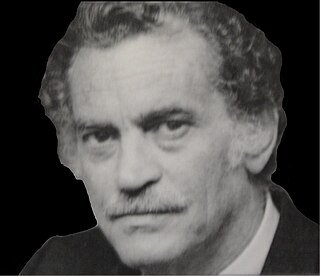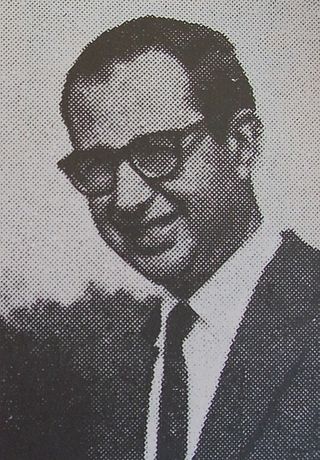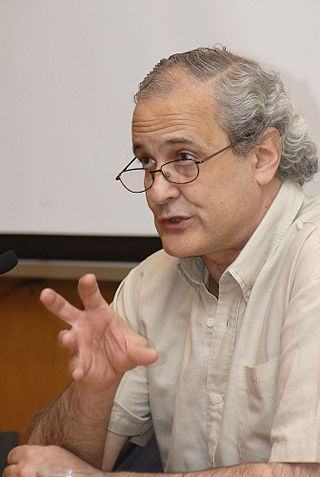
Beatriz Sarlo (born 1942) is an Argentine literary and cultural critic. She was also founding editor of the cultural journal Punto de Vista ("Point of View"). She became an Order of Cultural Merit laureate in 2009.

Beatriz Sarlo (born 1942) is an Argentine literary and cultural critic. She was also founding editor of the cultural journal Punto de Vista ("Point of View"). She became an Order of Cultural Merit laureate in 2009.
Beatriz Sarlo was born in 1942 and studied literature at the undergraduate and graduate levels at the University of Buenos Aires. The writer, critic, and dramatist David Viñas was an early mentor and influence. In 1978, she co-founded Punto de Vista which was one of the major dissident voices during the military regime which ended in 1983. Because of the authoritarian nature of the regime, Sarlo and her fellow contributors had to use pseudonyms, and subordinate political questions to aesthetic ones. Paradoxically, this entailed a rethinking of the political which moved Sarlo's thought away from an earlier tendency to Marxism and other forms of radicalism. She has continued to maintain a moderate-left political stance that refrains from promoting euphorias of free-market thought or populist solidarity.
Sarlo is a highly laurelled academic who also operates as a public intellectual. She has written both on traditional literary topics—her book on Jorge Luis Borges, published in 1993, is one of the seminal works on the great Argentine fabulist—but she has also worked in more cultural areas, such as feminism, the emergence of the modern Argentine city, and Argentina's divided sense of its place in Latin America. These various interests are linked by an overall concern with the intellectual and how the idea of the intellectual functions in contemporary discursive contexts. Sarlo is not a parochial or regional thinker, but participates in global debates occasioned by critical theory, postmodernity, and the destabilization of set political ideologies after the fall of Communism. She has warned, though, against the naive transnationalism seen in an earlier female Argentine intellectual, Victoria Ocampo. In some ways, Sarlo's project is analogous to the work of thinkers of the previous generation such as Angel Rama in its ability to traverse disciplinary and discursive boundaries, though Rama specifically has not been a huge influence on Sarlo.
Sarlo has worked with other major contemporary Argentine thinkers such as Carlos Altamirano and Ricardo Piglia. She held the Chair of Contemporary Literature at the Faculty of Arts and Letters at the University of Buenos Aires. [1] In 2001, she was denied a position as the equivalent of distinguished professor, in controversial circumstances. [2] She has also taught at several US universities, held the Simón Bolívar chair at the University of Cambridge, and been a visiting fellow at the Wissenschaftskolleg zu Berlin. She also writes regularly for Argentine newspapers such as La Nación, Clarín (for which she writes a weekly column), and Página 12.
In August 2021, Sarlo said during an interview that the Falkland Islands are British territory, sparking condemnation from veterans and government officials. Parts of the opposition defended her stance, as she said that she "cared very little" about criticism to her remarks. Sarlo said that the Falklands are like the south of Scotland and that the claims are founded before Argentina was formed as a nation. She also stated that 1982 invasion was a "national psychotic act". [3]

Luisa Valenzuela Levinson is an Argentine post-'Boom' novelist and short story writer. Her writing is characterized by an experimental style which questions hierarchical social structures from a feminist perspective.

Rodolfo Enrique Fogwill, who normally went only by his surname, Fogwill, was an Argentine short story writer, novelist, and businessman. He was a distant relative of the novelist Charles Langbridge Morgan. He was the author of Malvinas Requiem, one of the first narratives to deal with the Falklands War. Fogwill died on August 21, 2010, from a pulmonary dysfunction.
Maria Luisa Puga was a Mexican writer. Her 1983 novel Pánico o peligro won the Xavier Villaurrutia Award.

Gaucho literature, also known as gauchesco ("gauchoesque") genre was a literary movement purporting to use the language of the gauchos, comparable to the American cowboy, and reflecting their mentality. Although earlier works have been identified as gauchoesque, the movement particularly thrived from the 1870s to 1920s in Argentina, Uruguay and southern Brazil after which the movement petered out, although some works continued to be written. Gauchoesque works continue to be read and studied as a significant part of Argentine literary history.

Juan Gelman was an Argentine poet. He published more than twenty books of poetry between 1956 and his death in early 2014. He was a naturalized citizen of Mexico, country where he arrived as a political exile of the Military Junta.

Paul-François Groussac was a French-born Argentine writer, literary critic, historian, and librarian.

Carlos Andrés Escudé Carvajal was an Argentine political scientist and author, who during the 1990s served as special advisor to foreign minister Guido di Tella. As such, he advised on Argentine foreign policy strategy vis-à-vis the Western powers particularly in the wake of the Falklands War.

Noé Jitrik was an Argentine literary critic.

Arturo Carrera is an Argentine poet.

Adrián Gorelik is an architect, urban historian and leading commentator on urban issues in Argentina. His most well-known books are La sombra de la vanguardia: Hannes Meyer en México, 1938-1947, and La grilla y el parque: Espacio público y cultura urbana en Buenos Aires, 1887-1936 (1998). In 2003 he was awarded a Guggenheim Fellowship for a project entitled “The cycle of invention and critique of the ‘Latin American City’.”
Jorge B. Rivera (1935–2004) was an Argentine poet, essayist, critic, journalist and researcher on issues of history and popular culture. He was born in Buenos Aires in 1935 and died on August 27, 2004. He is considered a pioneer in research in mass communication in Argentina.
José María Aricó was a prolific essayist, militant activist, and one of the driving forces in creating the New Intellectual Left within Argentina. Strongly influenced by Marx and Marxist thinkers like Antonio Gramsci, Kautsky, and others, Aricó would go on to promote these intellectuals through his own writings, translations and teachings.

Ricardo Forster is an Argentine philosopher, historian of ideas and political critic.
Oscar Terán was an Argentinean philosopher.

Lisa Block de Behar is an Uruguayan professor of Linguistics and researcher in Literary Theory, Comparative Literature and Communication media.
Omar Acha is an Argentine historian and political essayist. He is a researcher at the Consejo Nacional de Investigaciones Científicas y Técnicas and also at the Centro de Investigaciones Filosóficas (Argentina). He teaches Philosophy of History at the Universidad de Buenos Aires. He was also a member of the editorial board of Herramienta. Revista de Teoría y Crítica Marxista, published in Buenos Aires.

Alejandro Pablo Avelluto is a journalist and book editor who held the office of Minister for Culture of Argentina since 10 December 2015 to September 2018, appointed by Mauricio Macri. Between 2014 and 2015 he served as General Coordinator of the Public Media System of the Autonomous City of Buenos Aires.

Andrea Graciela Giunta is an Argentine art historian, professor, researcher, and curator.

Adelia Di Carlo was an Argentine writer and chronicler linked to feminism during the 20th century. She also founded several organizations.
Nora Domínguez is a full professor of literary theory at the University of Buenos Aires. She was a co-founder of the Instituto Interdisciplinario de Estudios de Género at the University of Buenos Aires, which introduced gender studies as an academic field in 1992. Between 2010 and 2017, she was the director of the institute. Her book De dónde vienen los niños. Maternidad y escritura en la cultura argentina won the Essay Prize from the National Arts Foundation. In 2021, she published El revés del rostro. Figuras de la exterioridad en la cultura argentina, which won the Humanities Prize for the Southern Cone from the Latin American Studies Association in 2022. She is currently directing a six-volume work to compile the series Historia feminista de la literatura argentina. The first volume in the series was released in 2020.